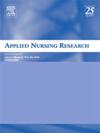Examining the effects of moral distress, compassion fatigue and burnout on intention to leave among nursing students in Hong Kong: A cross-sectional study
IF 2.7
4区 医学
Q1 NURSING
引用次数: 0
Abstract
Background
Compassion fatigue and burnout have detrimental effects on nursing students. Moral distress has been recognized as a contributing factor to both, potentially impacting the intention to leave nursing programme.
Aim
To examine relationships among moral distress, compassion fatigue and burnout on intention to leave the nursing programme among nursing students.
Methods
A cross-sectional correlational design was used. Four hundred eighty-four nursing students from nine higher educations participated. Data were collected using the Moral Distress Scale-Revised, Compassion Fatigue Self-Test, and a single item examining the intention to leave.
Results
Mild to moderate levels of moral distress but high levels of compassion fatigue and burnout were reported. In regression analysis, year of study (OR = 14.323, CI = 1.273–161.143, p < 0.031), length of clinical learning (OR = 1.061, CI = 1.020–1.103, p < 0.003), moral distress (OR = 3.181, CI = 1.848–5.475, p < 0.001), burnout (OR = 1.165, CI = 1.118–1.214, p < 0.001) were associated with a higher chance of intention to leave. Attendance of an ethics course for >30 h (OR = 0.164, CI = 0.041–0.653, p < 0.010) and the interaction between moral distress and burnout (OR = 0.977, CI = 0.968–0.987, p < 0.001) were associated with a significant decrease in the intention to leave.
Conclusion
Burnout is a strong predictor for intention to leave the nursing programme among nursing students. Interventions addressing moral distress, compassion fatigue, and burnout might prevent intention to leave the nursing programme.
探讨道德困扰、同情疲劳和职业倦怠对香港护理专业学生离职意向的影响:横断面研究
背景同情疲劳和职业倦怠对护理专业学生有不利影响。目的 探讨道德困扰、同情心疲劳和职业倦怠与护理专业学生离职意向之间的关系。方法 采用横断面相关设计。来自 9 所高等院校的 484 名护理专业学生参与了研究。采用道德困扰量表(修订版)、同情心疲劳自测和单项离校意向测试收集数据。结果报告的道德困扰程度为轻度至中度,但同情心疲劳和职业倦怠程度较高。在回归分析中,学习年份(OR = 14.323,CI = 1.273-161.143,p < 0.031)、临床学习时间(OR = 1.061,CI = 1.020-1.103,p < 0.003)、道德困扰(OR = 3.181,CI = 1.848-5.475,p <;0.001)、职业倦怠(OR = 1.165,CI = 1.118-1.214,p <;0.001)与较高的离职意向相关。参加 30 小时的道德课程(OR = 0.164,CI = 0.041-0.653,p <0.010)以及道德困扰与职业倦怠之间的交互作用(OR = 0.977,CI = 0.968-0.987,p <0.001)与离职意向的显著降低有关。针对道德困扰、同情疲劳和职业倦怠的干预措施可能会防止护理专业学生产生退学意向。
本文章由计算机程序翻译,如有差异,请以英文原文为准。
求助全文
约1分钟内获得全文
求助全文
来源期刊

Applied Nursing Research
医学-护理
CiteScore
4.50
自引率
0.00%
发文量
65
审稿时长
70 days
期刊介绍:
Applied Nursing Research presents original, peer-reviewed research findings clearly and directly for clinical applications in all nursing specialties. Regular features include "Ask the Experts," research briefs, clinical methods, book reviews, news and announcements, and an editorial section. Applied Nursing Research covers such areas as pain management, patient education, discharge planning, nursing diagnosis, job stress in nursing, nursing influence on length of hospital stay, and nurse/physician collaboration.
 求助内容:
求助内容: 应助结果提醒方式:
应助结果提醒方式:


